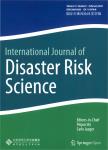Advancing the Disaster and Development Paradigm
Advancing the Disaster and Development Paradigm作者机构:Department of Geography and Environmental Sciences /Disaster and Development Network (DDN) Northumbria University
出 版 物:《International Journal of Disaster Risk Science》 (国际灾害风险科学学报(英文版))
年 卷 期:2018年第9卷第4期
页 面:486-495页
核心收录:
学科分类:0709[理学-地质学] 08[工学] 0303[法学-社会学] 0832[工学-食品科学与工程(可授工学、农学学位)] 083002[工学-环境工程] 0830[工学-环境科学与工程(可授工学、理学、农学学位)] 1201[管理学-管理科学与工程(可授管理学、工学学位)] 0708[理学-地球物理学] 0705[理学-地理学] 0837[工学-安全科学与工程] 0706[理学-大气科学] 0813[工学-建筑学] 0704[理学-天文学] 0833[工学-城乡规划学]
主 题:Disaster and development paradigm Disaster risk reduction Disaster risk management Local action research
摘 要:Consolidation of disaster and development studies as an integrated field of action research that influences policy has proved to be fundamental to global disaster risk reduction, sustainable development, climate change, and humanitarian agreements. However, challenges in achieving targets, such as those of the Sendai Framework for Disaster Risk Reduction 2015–2030 and the Sustainable Development Goals, requires further advances of the disaster and development paradigm underpinning these aspirations. This article presents perspectives that grew primarily from local action research, particularly research carried out with marginalized and highly at-risk groups of people in Southern Africa and South Asia.Analytical fronts from these findings emphasize disaster and development risk assessment opportunities that consolidate earlier ideas and extend understanding of disaster and development-related risk intervention options. These acknowledge severe shortcomings in disaster risk reduction progress while including greater use of hope as an active ingredient. This process of paradigm exploration remains fundamental to achieving disaster risk reduction, sustainable development, and associated policy objectives. The analysis presented here reiterates earlier groundings in people-centric perspectives, emphasizing social relations and systems of meaning as essential active ingredients for challenging power structures, technology, education, and human behavior. The analysis proposes some consequent thematic fronts for increased investment. These includeinvesting in early buildup of well-being before a disaster,better living with uncertainty, and overcoming the barriers to desired disaster and development outcomes. The article is intended to contribute to an ever-evolving paradigm of disaster and development risk that requires impetus from personal and collective values beyond calculations of disaster and development.



